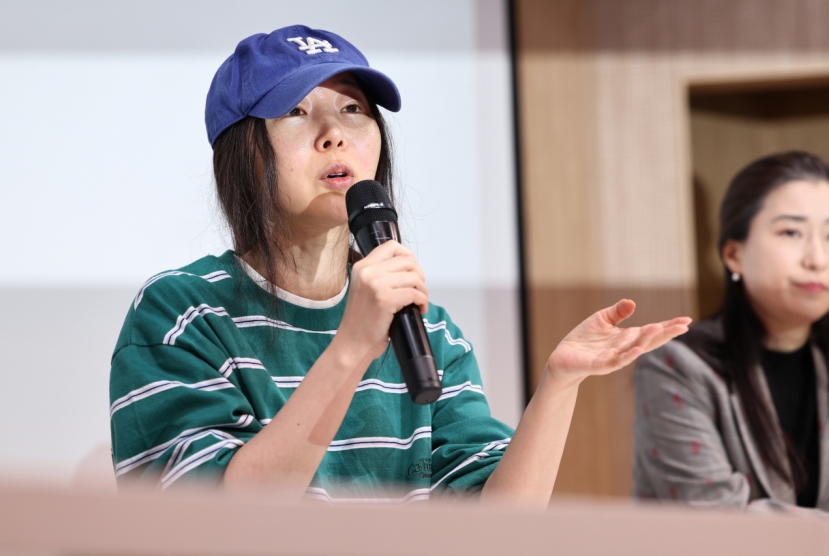Reports on celebrity suicides trigger copycat effect: study
By Yoon Min-sikPublished : March 18, 2014 - 16:22
Media coverage of suicides by prominent figures can lead to a spike in suicide rates among ordinary people, a Korean researcher said Tuesday.
A team led by Kim Nam-kug, an assistant professor of convergence medicine at Asan Medical Center, analyzed the 15 celebrity suicides most covered by the media between 1990 and 2010, and compared the number of suicides following those deaths. They saw a correlation coefficient of 0.74 between the number of news articles and the number of deaths.
This means for every 100 news articles covering the celebrities’ deaths, 74 copycat suicides occurred, Kim said. This “Werther effect,” referring to an increase in suicides after a widely publicized suicide, occurs especially among people who deeply revered the celebrities.
“People tend to think prominent figures are worth respecting, which leads them to mirror themselves after the famous people. This is more common among those who are vulnerable or depressed,” said Kim.
The troubled fans imitate the actions of their heroes, even to the point of suicide, and often take their lives in the same ways the celebrities did, Kim said.
Data from 2013 by the Ministry of Health and Welfare showed that the number of suicides by hanging spiked to 1,197 in October 2008, more than double the previous month. It was the month when popular actress Choi Jin-sil died by hanging herself.
The total number of suicides over the next two months was 3,081, which marked an increase of 1,274 from the same period the year before.
The effect, he said, was not limited to singers and actors. When political and economic big names like former President Roh Moo-hyun and tycoon Chung Mong-hun took their own lives, the ripple effect was also felt throughout society in the form of mimic suicides.
“It’s more related to the amount of media coverage than the characteristics of the deceased,” he said. “The reason a bigger celebrity prompts more suicides is because their deaths attract more attention from the press.”
Last year, the Welfare Ministry came up with guidelines on media coverage of suicides.
These include avoiding the word “suicide” as much as possible, avoiding reporting details, not glorifying the suicides in any way and not using the suicide to point out social problems.
The guidelines, however, are rarely followed as many news outlets present graphic details of celebrity suicides.
“Although the number of suicides in Korea is higher than in any other OECD country, there has not been enough research on suicides,” he said, underscoring the media’s role in the frequent occurrence of copycat suicides. “There needs to be stricter guidelines for the media on reporting suicides.”
The study was published in the latest edition of the journal Epidemiology and Psychiatric Sciences.
By Yoon Min-sik
(minsikyoon@heraldcorp.com)
A team led by Kim Nam-kug, an assistant professor of convergence medicine at Asan Medical Center, analyzed the 15 celebrity suicides most covered by the media between 1990 and 2010, and compared the number of suicides following those deaths. They saw a correlation coefficient of 0.74 between the number of news articles and the number of deaths.
This means for every 100 news articles covering the celebrities’ deaths, 74 copycat suicides occurred, Kim said. This “Werther effect,” referring to an increase in suicides after a widely publicized suicide, occurs especially among people who deeply revered the celebrities.
“People tend to think prominent figures are worth respecting, which leads them to mirror themselves after the famous people. This is more common among those who are vulnerable or depressed,” said Kim.
The troubled fans imitate the actions of their heroes, even to the point of suicide, and often take their lives in the same ways the celebrities did, Kim said.
Data from 2013 by the Ministry of Health and Welfare showed that the number of suicides by hanging spiked to 1,197 in October 2008, more than double the previous month. It was the month when popular actress Choi Jin-sil died by hanging herself.
The total number of suicides over the next two months was 3,081, which marked an increase of 1,274 from the same period the year before.
The effect, he said, was not limited to singers and actors. When political and economic big names like former President Roh Moo-hyun and tycoon Chung Mong-hun took their own lives, the ripple effect was also felt throughout society in the form of mimic suicides.
“It’s more related to the amount of media coverage than the characteristics of the deceased,” he said. “The reason a bigger celebrity prompts more suicides is because their deaths attract more attention from the press.”
Last year, the Welfare Ministry came up with guidelines on media coverage of suicides.
These include avoiding the word “suicide” as much as possible, avoiding reporting details, not glorifying the suicides in any way and not using the suicide to point out social problems.
The guidelines, however, are rarely followed as many news outlets present graphic details of celebrity suicides.
“Although the number of suicides in Korea is higher than in any other OECD country, there has not been enough research on suicides,” he said, underscoring the media’s role in the frequent occurrence of copycat suicides. “There needs to be stricter guidelines for the media on reporting suicides.”
The study was published in the latest edition of the journal Epidemiology and Psychiatric Sciences.
By Yoon Min-sik
(minsikyoon@heraldcorp.com)


![[Herald Interview] 'Amid aging population, Korea to invite more young professionals from overseas'](http://res.heraldm.com/phpwas/restmb_idxmake.php?idx=644&simg=/content/image/2024/04/24/20240424050844_0.jpg&u=20240424200058)
















